Centre for Policy Development's Blog, page 21
February 18, 2020
John Menadue Oration 2020: postponed
As I’m sure you will understand, we have decided to postpone the third John Menadue Oration with Professor Megan Davis, that was to have taken place on 30 March in Sydney. This is a natural consequence of the COVID-19 pandemic and a decision fully supported by our hosts, MinterEllison, our Orator, Megan Davis, and our founding Chairperson, John Menadue AO, after whom the Oration is named.
The Oration was completely booked out with a long waitlist. It is disappointing for everyone to postpone but we know there will be no shortage of enthusiasm when we are able to reschedule. The health and safety of our community must come first.
Like many organisations in Australia and around the world, CPD has been transitioning to a new environment with respect to travel and work from home arrangements. In the coming months, we will hold most of our meetings, workshops and roundtables via phone, videoconference or online. Our thoughts and best wishes go out to everyone in this difficult time, especially those in our community who do not have this option, and those who are already vulnerable and experiencing hardship. We hope Australia can deliver for them and look forward to you all being able to hear Megan explain how Australia can deliver for all when the Oration is rescheduled.
The post John Menadue Oration 2020: postponed appeared first on Centre for Policy Development.
John Menadue Oration 2020: Can Australia Deliver? | 30 March, Sydney
We are delighted to let you know that the third John Menadue Oration will be delivered by Professor Megan Davis in Sydney on 30 March 2019.

Professor Megan Davis is Pro Vice Chancellor Indigenous and Professor of Law at the University of New South Wales (UNSW). She is also an Acting Commissioner of the NSW Land and Environment Court and an expert member of the United Nations Human Rights Council’s Expert Mechanism on the Rights of Indigenous Peoples. Professor Davis is formerly Chair and expert member of the United Nations Permanent Forum on Indigenous Issues.
Professor Davis’ renowned work on the recognition of Aboriginal and Torres Strait Islander peoples in the Australian Constitution will be known to many of you. As a constitutional lawyer and a member of the Referendum Council and the Expert Panel on the Recognition of Aboriginal and Torres Strait Islander Peoples in the Constitution, she helped craft the Uluru Statement from the Heart. She is very much the constitutional legal scholar for our times.
Professor Davis is also a Commissioner on the Australian Rugby League Commission and supports the North Queensland Cowboys and the QLD Maroons.
Professor Davis will address the question: ‘Can Australia Deliver?’. This theme builds on Megan’s work, as well as our 2018 Oration ‘Can the State Deliver?’ given by Mariana Mazzucato and 2017 Oration, ‘Can Democracy Deliver?’, delivered by Marty Natalegawa, former Indonesian Foreign Minister.
CPD’s flagship Oration has been named in honour of John Menadue AO, CPD’s founding Chairperson, in recognition of John’s contribution to public policy in Australia and to CPD. John served as Secretary of the Department of Prime Minister and Cabinet under Prime Ministers Gough Whitlam and Malcolm Fraser, was Australia’s Ambassador to Japan and held senior roles in the business community.
Confirm your attendance here.
The post John Menadue Oration 2020: Can Australia Deliver? | 30 March, Sydney appeared first on Centre for Policy Development.
December 23, 2019
CPD are hiring
CPD are seeking to hire people for two positions.
Events and Communication Coordinator
The successful candidate will be based in CPD’s Sydney or Melbourne office. The position can be part-time or full-time. Remuneration for the position will be determined based on the experience of the selected candidate. For further information please contact Shivani Nadan at admin@cpd.org.au or call (03) 9929 9915.
Candidates should include the following in their application:
Covering letter and CV (not to exceed three pages in total);
A sample of writing for a general audience; and
Name and details of at least three referees.
Candidates should apply by emailing their application to admin@cpd.org.au with the subject line ‘Application for Senior Economic Adviser or Event and Communications Coordinator’. The deadline is 11.59pm Sunday 12 January 2020. Only shortlisted candidates will be contacted.
Further information on each of the positions can be found below via EthicalJobs.
Events and Communications Coordinator
Senior Economic Adviser
The post CPD are hiring appeared first on Centre for Policy Development.
The future of Australia’s soft power | ANU-CPD Policy Dialogue | December 2019

On 3 December, we hosted our fifth ANU-CPD Policy Dialogue for 2019. Our focus was the future of Australia’s soft power. The roundtable discussion featured opening remarks from Professor Geoffrey Wiseman (Director, Asia-Pacific College of Diplomacy, Australian National University) and Jemima Garrett (Freelance journalist and co-author of Hard News and Free media as the sharp edge of Australian soft power, ASPI).
The roundtable was jointly hosted by CPD with ANU, and brought together 18 leaders from government, philanthropy, civil society, media, business and academia. The roundtable was moderated by ANU Chancellor and former Foreign Minister, the Hon Gareth Evans AC QC, and held under the Chatham House Rule. The interactive discussion was a chance for the diverse group to discuss the current and future state of soft power for Australia, considering both the domestic and international context.
Discussion
The discussion opened with expert participants giving an outline of soft power as a policy concept and provided context for how soft power can be better integrated through government policy, leveraging Australia’s rich multicultural heritage as well as its creative industries to navigate and build relationships in our region. Further details were also provided on the media’s role in the debate, focussing on the Pacific as a key case for Australia.
The discussion touched on:
How other countries are using the influence of soft power within the region, particularly through media, whilst Australia is committing fewer resources to this area.
The importance of Australia’s domestic policy decisions, including our approach to Indigenous issues, on our standing with other countries in the world.
Understanding the unique position Australia is in to invest more into soft power activities and the reach that we could potentially have in strengthening our international diplomacy.
Participants
Andrew James (Commercial Manager, Mondo); Anthea Hancocks (Chief Executive Officer, Scanlon Foundation); Daniel Flitton (Managing Editor, The Intepreter, The Lowy Institute); David Livingston (Manager, International and Civic Services, City of Melbourne); Gareth Evans AC QC (Chancellor, Australian National University); Geoff Heriot (Director, Heriot Media & Governance); Geoffrey Wiseman (Director, Asia Pacific College of Diplomacy, Australian National University); Jemima Garrett (Freelance journalist); Jewel Topsfield (Melbourne Editor, The Age, Fairfax Media); Ilaria Walker (Audience and Content Expert, International Strategy, ABC); Katriina Heikkanen (Indigenous & Social Policy Manager, Australian Football League); Mark Lawrence (Managing Director, Mark Lawrence Group); Melissa Conley Tyler (Director, Asialink Diplomacy, Asialink); Michael Rowland (Journalist, ABC); Nicole Bieske (Head of Program, Transparency International Australia); Susan Coles (Deputy State Director Victoria, Department of Foreign Affairs and Trade); Tanya Hosch (General Manger of Inclusion and Social Policy, AFL); Travers McLeod (Chief Executive Officer, Centre for Policy Development); Vipul Lhosla (Manager of Research, ABC International Development).
The post The future of Australia’s soft power | ANU-CPD Policy Dialogue | December 2019 appeared first on Centre for Policy Development.
Terry Moran and Travers McLeod opinion piece on the Thodey Review – Canberra Times
Waiting for the release of David Thodey’s review of the Australian Public Service was a bit like Waiting for Godot. No one seemed to know when it would arrive, even though it was commissioned over 18 months ago, submitted in September, and big machinery of government changes were announced ahead of time.
To be sure, this wasn’t Thodey’s fault. As he says, there have been 18 APS reviews over the past decade, yet little has changed. Like the ghosts in Dickens’ Christmas Carol, Thodey’s review has strong echoes of Reviews Past.
A tendency in Canberra to put off difficult conversations has been obvious the past few months. A Friday the 13th release of the Thodey Report just before Christmas, as smoke shrouded much of Australia, reinforces this.
When the Federal Parliament returns, the Thodey Report should be debated in full. The patient cannot ignore the prognosis. Unless the recommendations are implemented to renovate our public institutions and approach to service delivery, we risk rising populism and the Trumpian nastiness flowing from it. The Thodey Report spoke of “long-running underinvestment in the APS’s people, capital and digital capability”. Successive governments have made the APS impotent in solving big problems in the best interests of Australian communities. That must change.
In August, Prime Minister Morrison asked for a “clear line of sight” for public servants “straight through to the Australian public”. In his written response to the Thodey Report, the PM called for “a step-change in the quality of services”. Three of his six guideposts are “better services”, “getting delivery right” and “connecting the APS to all Australians”. His consolidation of departments appears an attempt to get a clearer line of sight to services in communities.
Our view is this service delivery theme will only work if three courses of treatment identified in the Thodey Report are prioritised.
The first is putting place front and centre to address cycles of disadvantage in Australia, underpinned by investment in public capability at local level to coordinate effective services.
The importance of place was central to Centre for Policy Development research provided to the Thodey Review. It was a key verdict of last year’s expert panel on employment services, led by Sandra McPhee, and this year’s review of settlement outcomes by Peter Shergold.
We have found place-based approaches to delivering critical services achieve better economic and social outcomes. Our Community Deals model being trialled in Melbourne’s West allows for coordinated delivery of key services by a local consortium, informed by family-centred case management and strategic engagement.
Community Deals, like City Deals, champion a local approach to boost jobs, business creation and community participation. They are genuine partnerships between government, industry and communities. They draw a line under the fantasy that outsourcing is a panacea. The Aged Care Royal Commission has revealed grave consequences when government cannot be or see beyond the contract gate. Looking after vulnerable Australians should not be seen as an industry or a market. Our democracy suffers when it is.
Our research suggests three-quarters of Australians think it’s important for government to maintain capability to deliver social services directly. They rate services delivered by government as more accessible, affordable, accountable and better quality than those delivered by private companies and even by charities.
Restoring public delivery capability or benchmarking is vital to lifting confidence in service delivery. By this we mean insistence on a public delivery option to foster service collaboration and provide a clear marker on quality and efficiency. A future fund for place-based investments would help too. Extending all jobactive contracts to 2022 is one very expensive example of putting hard reforms in the too hard basket.
The second course of treatment is to embed the new APS professions model and grow long-term capability.
This cannot start unless the PM concedes the APS staffing caps corrode capability. His department told a recent inquiry staffing caps have meant “agencies have more frequently needed to engage external contractor and consultancy services to fill key roles” and that removing caps offers “greater flexibility to recruit specialist staff at a reduced cost”. The Thodey Report agreed, saying caps “risk the unintended consequence of reducing capability across the service” and that they “have made it difficult to maintain long-term strategic policy functions, which has led to a divestment in analytical capability”.
The Australian Public Service Commission’s mandate should be expanded faster. It can grow capability through the 2020s in organisational change, human-centred design, service delivery and the digital economy. It can conduct deep evaluations of the delivery of domestic policy. Current Commissioner Peter Woolcott will know the loss of capability, presence and integrity hurts Australia at home and abroad. A National Integrity Commission is an essential part of this endeavour.
The final course of treatment is a bipartisan effort to rebuild APS confidence and instil the “missions” mindset Mariana Mazzucato spoke of in Australia last year.
Mazzucato’s work on public value and the entrepreneurial state doesn’t pit government against business, unions or the community. It provides a framework for us to agree missions we can tackle together, like recycling, employment, or net zero emissions. Indeed, the Thodey Report identified climate change as a core challenge requiring integrated long-term policy advice from the APS.
The step-change the PM wants is achievable. But it will only be achieved with a public service funded to think for itself and deliver missions for Australia alongside communities and businesses. Thodey and his panel feared acute risks for policy, regulation and delivery if their recommendations were ignored. They insisted “the impact of strengthening APS capability will be profound” and “the only way to ensure that government expectations are met, priorities are delivered, and results achieved”.
We agree. Focussing on missions that matter most to Australians is consistent with the PM’s guideposts and the Thodey Report. It allows us to solve our biggest problems together and renew trust in democracy at the same time.
Terry Moran AC is Chairperson and Travers McLeod is CEO of the Centre for Policy Development. This opinion piece appeared in the Canberra Times on 24 December 2019 and is available as published here.
Related reading
Terry Moran says chronic underinvestment rendered public service ‘impotent‘, Adrian Rollins, Canberra Times, 24 December 2019 (pdf)
Consultants clean up as APS stagnates, Adrian Rollins, Canberra Times, 24 December 2019 (pdf)
The post Terry Moran and Travers McLeod opinion piece on the Thodey Review – Canberra Times appeared first on Centre for Policy Development.
December 12, 2019
Legal action on climate is what we all want to avoid – CPD CEO Travers McLeod in the AFR
Efforts to understand climate risk within companies and across the economy are not about managing climate through the legal system, usurping the role of government, or forcing companies to go it alone on saving the planet. Quite the opposite. They are about making companies, investors, governments and communities aware of the risks and opportunities and better equipped to respond to them.
Last month the Centre for Policy Development brought together leaders from across the Australian and international economy for a discussion about climate change. The group we convened were not motivated by ideology, politics or belief. They were asked to take stock of where we are on climate risk and consider what the next set of priorities should be.
The headlines have focused on Ken Hayne, who reinforced what investors, regulators, the G20, scientists, economists and lawyers have said for some time. His key point was we are not helpless in the face of climate physics, decisions taken offshore, the complexity of managing exposures at home, or an increasing risk of legal liability. More effective firm and system-level responses are essential.
Mr Hayne was joined at the roundtable by leaders from Australia’s biggest banks, insurers, investors, businesses and superannuation funds, our financial regulators, the Bank of England, the Reserve Bank of New Zealand, and the Investor Group on Climate Change. Current and former senior government officials were there too.
The conclusions from the discussion were clear and uncontroversial. Climate change impacts are upon us now. Responses thus far are insufficient to understand, manage or respond to the physical and transition risks ahead. The way forward requires greater collaboration across the public and private sectors. Australia’s economy is acutely exposed, including to measures by investors and trading partners stepping up their focus on climate, and Australian companies trading abroad face growing retaliatory risks. A combination of physical and transition risks is inevitable due to temperature rises locked in and actions being taken offshore.
These conclusions are significant partly because of the group from which they emerged: decision-makers from across Australia’s financial system who see this as a top-tier issue for their institutions and for the economy at large. There were practical steps suggested on how to implement these conclusions so that decision-makers are better equipped to shoulder their responsibilities, work through the scenarios, and make sophisticated decisions in a fragile and vulnerable marketplace.
It would be a mistake to reduce these conclusions or Mr Hayne’s remarks to a preoccupation with legal action. This is precisely what everyone is trying to avoid. A cursory look at education courses run by the Australian Institute of Company Directors or TCFD disclosures of leading companies suggests directors are incorporating climate risk into policies, processes and risk maps. Our conclusions put the TCFD framework centre stage. They reinforce the importance of companies thinking about climate in the context of scenarios. They don’t challenge the right of government to set climate policy, but ask government to coordinate efforts to manage a problem staring us in the face. We asked for a joint national mission.
This doesn’t mean starting from scratch. There are separate initiatives being driven by industry, regulators and government that can be joined up. Combining the best expertise and data will allow us to stress test the economy as a whole, agree a set of adaptation priorities, examine our disaster preparedness, and ensure our infrastructure, cities and communities are more resilient. The United Kingdom is a good example of a country conducting economy-wide stress testing of climate scenarios, with the Bank of England playing a central and coordinating role. This is happening under a Conservative government at a time of grave policy and political upheaval.
In September, the Global Commission on Adaption on which Macquarie Bank CEO Shemara Wikramanayake sits made similar recommendations to those that emerged from our roundtable. Convened by 20 countries, the Commission called for “a revolution in understanding, planning, and finance that makes climate risks visible, incorporates these risks into all decisions, and releases public and private financial flows.” They found that “investing $1.8 trillion globally in five areas from 2020 to 2030 could generate $7.1 trillion in total net benefits”.
For anyone in bushfire-affected parts of Australia this week it has been impossible to escape climate-related risks. Schools have closed, offices have been evacuated, houses have been destroyed and lives have tragically been lost. Sadly, there is worse to come. Climate change is a ratcheting risk that will touch every part of Australian society. Unlike other countries, we aren’t working together to map system-level risks, opportunities and responses. That’s what the roundtable was about, not “lawfare”.
This piece was published in the Australian Financial Review on 13 December 2019. You can read more about CPD’s climate roundtable here.
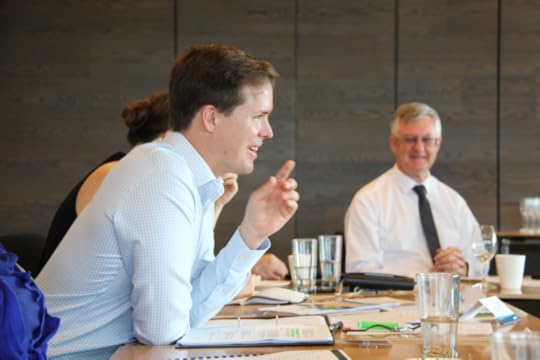
The post Legal action on climate is what we all want to avoid – CPD CEO Travers McLeod in the AFR appeared first on Centre for Policy Development.
December 8, 2019
CPD Business Roundtable on Climate and Sustainability | EVENT | November 2019

On 21 November, CPD convened a business roundtable on climate change and sustainability which brought together senior executives and directors from Australia’s biggest banks, insurers, investors, businesses and superannuation funds, senior representatives from Australia’s leading financial regulators and key policy departments, and a number of special local and international guests.
Participants included Dr Guy Debelle (Reserve Bank of Australia), Sarah Breeden (Bank of England), John Price (ASIC), Geoff Summerhayes (APRA), Emma Herd (IGCC), Don Russell (AustralianSuper), Martin Parkinson (former Secretary of the Department of Prime Minister and Cabinet and Treasury), Sarah Barker (Minter Ellison), Greg Combet (IFM Investors) and former High Court Justice and Royal Commissioner the Hon Kenneth Hayne AC QC.
CPD convened the roundtable to consider what Australia needs to prioritise next in its climate risk responses, amidst mounting climate impacts and growing scrutiny of Australia’s climate credentials. This was the latest in a long-running series of CPD research, events and thought leadership on the economic and financial dimensions of climate change, including the legal opinions by Noel Hutley SC on directors’ duties and climate risk, and landmark public statements on climate by APRA, ASIC and the Reserve Bank hosted by CPD since 2017.
The discussion highlighted that the bar on climate risks continues to rise for Australian company directors, investors and regulators. It also found strong support for accelerated action on climate change and a new national mission to address climate risk and opportunity across Australia’s economy and financial system.
A summary of the main conclusions from the discussion is available below along with other key documents. Please note that this summary has been prepared by the roundtable organisers and does not necessarily reflect official policy or the position of any of the individuals or organisations present at the roundtable.
Key documents
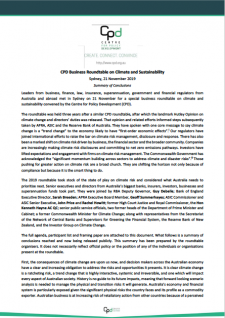

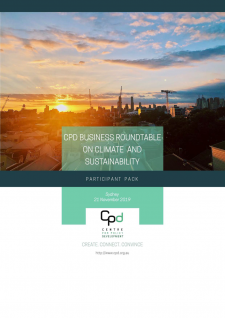
Summary of roundtable conclusions
Roundtable participant list
Roundtable pack including agenda and framing paper
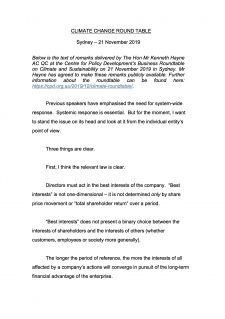
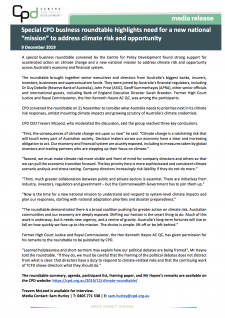
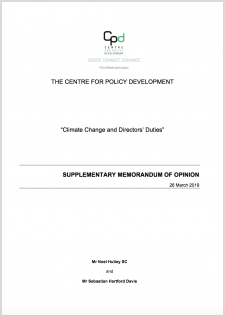
Remarks to roundtable by Kenneth Hayne AC QC
CPD media release
Hutley SC opinion on climate and directors duties
Background
November’s event was held three years on from a similar CPD roundtable in 2016 which culminated in the release of the landmark Hutley SC legal opinion on climate change and directors’ duties (updated in 2019). Over the past three years, Australia’s financial regulators have stepped up their leadership on the financial and economic impacts of climate change through coordinated statements and responses by APRA, ASIC and the Reserve Bank. Many Australian companies and investors have now adopted more ambitious and detailed climate-related disclosures, targets and strategies. However, despite recent progress, Australia remains well behind global best practice, even as the physical impacts of climate change mount and the risks and opportunities associated with a zero carbon transition become more urgent and apparent.
At this critical juncture, our roundtable brought together a group of influential leaders to take stock of Australian approaches to climate risk to date and to consider the next set of crucial interventions and opportunities to deliver more far-reaching responses. The discussion was held under the Chatham House Rule.
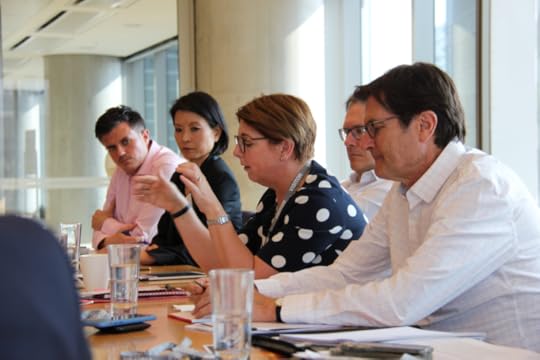
(From left to right) Roundtable participants Nick Jeffs (Reserve Bank of New Zealand), Jacqueline Chow (Coles), Sarah Breeden (Bank of England), Guy Debelle (Reserve Bank of Australia) and Greg Combet (IFM Investors).
Discussion and outcomes
Bank of England Executive Director Sarah Breeden provided opening remarks for the discussion. Sarah provided a snapshot of global trends and regulatory responses on climate risk, including new initiatives being undertaken by the Bank of England and the Central Banks and Supervisors Network for Greening the Financial System.
The Hon Ken Hayne AC QC also addressed the group, and has provided the text of his remarks for publication by CPD. He said that the law, international opinion and Australian regulatory developments make the position for company directors clear: “directors have a duty to respond to climate-related risks and…the continuing work of the TCFD shows directors what they should do.”
“A response often seen in Australian political discourse is that “The issue is large; Australia is comparatively small; nothing we do will affect the outcome if the big emitters do not act.” That is, the response is “We can do nothing that will help”. By making that response, we are persuading ourselves that we are helpless. Boards will reinforce that sense of helplessness if they put climate risk into a bucket marked “non‑financial risks”…[A]s recent events in the financial services industry should have shown, the notion of “non‑financial” risks can be very misleading…”
“[T]he choice for a board is between responding or having a response thrust upon the company. And boards simply cannot confine their attention to the short-term. As I have said, entities which did not look beyond short‑term profit have recently suffered very large financial and non‑financial losses…”
“Both learned helplessness and short‑termism yield a result that fits comfortably with those who still see climate‑change as a matter of belief or ideology. Framing the most recent debates provoked by the bushfire emergencies as part of the “culture wars” reinforces the notion that climate science is a matter of belief, not scientific observation and extrapolation. No less importantly, because the debate remains framed as a debate about belief, learned helplessness and short‑termism can be translated into the nativist‑populist terms that now have such currency in many political systems.” Mr Ken Hayne AC QC
Participants then shared their perspectives on how climate-related risks are being managed in Australia, and discussed opportunities and priorities for taking this response to the next level. The discussion highlighted three key conclusions:
First, the consequences of climate change are upon us now, and decision makers across the Australian economy have a clear and increasing obligation to address the risks and opportunities it presents. Australia’s economy and financial system is particularly exposed to climate impacts, and there has been a paradigm shift in regulatory and legal expectations on climate risk management and disclosure. Boards must recognize the nature and scope of climate risk and respond accordingly, including through rigorous application of the TCFD framework.
Second, climate risk must be made more visible and front of mind for company directors to pull forward the transition in the real economy. A significant ramp up in the availability and quality of decision-relevant information is required. Regulators, firms, governments and sectors will need to work together to establish consistent scenarios, to share data, and to identify and commit to science-based targets and a net-zero trajectory consisted with the Paris Agreement. Joint work and resources to underpin more rigorous and consistent scenario analysis and stress testing is a key priority.
Third, more effective collaboration and leadership across the public and private sectors is an essential condition to understand and respond to climate risk and opportunity as it impacts the Australian economy as a whole. Multiple initiatives to are underway to better understand sustainable finance and climate and disaster risk across financial regulators, industry and government. Now is the time to join up this effort across public and private sectors to understand how climate risk impacts our financial system and economy, and what can be done about it. This needs to be an economy-wide mission, with suitable coordination and sharing of resources, data and expertise.
CPD CEO Travers McLeod said that the roundtable highlighted broad support and consensus around a more ambitious, co-ordinated response to climate risk.
“The seniority and breadth of the roundtable participants shows that there has been a step-change in awareness on climate-related risks. Statements by our leading financial regulators and their international peers have very clearly demonstrated that this is one of the most pressing financial and economic issues that we face, and leaders in business and industry are beginning to adress this challenge head-on.”
“Those pushing for greater action on climate risk are a broad church. They are shifting the horizon not only because of compliance but because it is the smart thing to do. There is broad awareness that the climate crisis poses increasingly serious risks for Australian firms and investors, and that there will also be major opportunities in a zero-carbon transition. What is needed now is a concerted shift from awareness to action.”
“Ideally, this would be embodied in a new national ‘mission’ to understand climate impacts and plan our responses, starting with national adaptation priorities and disaster preparedness. Much of this work is underway, but it needs new urgency, and a centre of gravity. Australia’s long-term fortunes will rise or fall on how we face up to this challenge in the decade ahead. The choice is simple: lift off or be left behind.” Travers McLeod
CPD would like to thank roundtable participants for their time and for being part of a candid and constructive discussion. We would also like to thank ANZ for hosting the event.

Travers McLeod and Martin Parkinson
Media coverage
Hayne rebukes directors on climate risk failure, James Fernyhough, Australian Financial Review, 9 December 2019
No more room for excuses on climate, Ben Potter, Australian Financial Review, 9 December 2019
RN Breakfast, ABC radio, 9 December 2019
Politics with Michelle Grattan, RN Breakfast, ABC radio, 9 December 2019
Further reading
Avoiding the storm: climate change and the financial system, speech by Bank of England Executive Director Sarah Breeden to Official Monetary & Financial Institutions Forum , April 2019.
Updated Hutley SC and Hartford Davis opinion on directors’ duties and climate risk, March 2019.
Climate change and the economy, speech by RBA Deputy Governor Dr Guy Debelle to Centre for Policy Development Public Forum, March 2019.
Climate change, speech by ASIC Commissioner John Price to Centre for Policy Development Public Forum, June 2018.
Climate horizons: scenarios and strategies for managing climate risk, Centre for Policy Development report by Sam Hurley and Kate Mackenzie, June 2018.
The weight of money: a business case for climate risk resilience, speech by APRA Executive Member Geoff Summerhayes to Centre for Policy Development Public Forum, November 2017.
CPD roundtable on directors duties, climate risks and sustainability, October 2016.
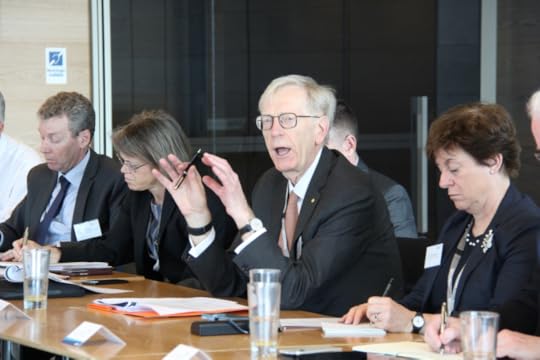
From left to right: Roundtable participants John Price (ASIC), Jo Evans (Department of Environment and Energy), Ken Hayne, Vicki Wilkinson (Treasury).
The post CPD Business Roundtable on Climate and Sustainability | EVENT | November 2019 appeared first on Centre for Policy Development.
Full text of Kenneth Hayne AC QC remarks to CPD climate roundtable
Below is the text of remarks delivered by The Hon Mr Kenneth Hayne AC QC at the Centre for Policy Development’s Business Roundtable on Climate and Sustainability on 21 November 2019 in Sydney. Mr Hayne has agreed to make these remarks publicly available. Further information about the roundtable can be found here: https://cpd.org.au/2019/12/climate-roundtable/ .
“Previous speakers have emphasised the need for system‑wide response. Systemic response is essential. But for the moment, I want to stand the issue on its head and look at it from the individual entity’s point of view.
Three things are clear.
First, I think the relevant law is clear.
Directors must act in the best interests of the company. “Best interests” is not one‑dimensional – it is not determined only by share price movement or “total shareholder return” over a period.
“Best interests” does not present a binary choice between the interests of shareholders and the interests of others (whether customers, employees or society more generally).
The longer the period of reference, the more the interests of all affected by a company’s actions will converge in pursuit of the long‑term financial advantage of the enterprise.
Second, international opinion is also clear.
International opinion is now firmly behind the need for all entities with public debt or equity to respond to climate change issues in their Governance, their Strategy, their Risk Management and their Metrics and Targets and, importantly, to record their responses to the issues in their financial reports. The work of the Bank of England and the FSB’s Taskforce on Climate‑related Financial Disclosures both forms and reflects that opinion.
Third, the position of Australian regulators is clear.
ASIC, APRA and the Reserve Bank have all recently made plain the significance each of those bodies attaches to climate‑related issues.
The inevitable consequence of the three points I have made about the law, international opinion and domestic regulators is that, in Australia, a director acting in the best interests of the company must take account of, and the board must report publicly on, climate‑related risks and issues relevant to the entity.
As the 2019 TCFD Status Report shows, the speed at which changes are needed to limit the rise in the global average temperature obliges more companies to consider the potential impact of climate change and disclose their material findings than are now doing so. The entities, and their boards must ask at least two questions:
What is the potential financial impact of climate-related issues?
What is now, and what will be, our strategic response?
All this being so, what is the issue? Directors have their duties; there are clear statements of what those duties require; regulators have said plainly that they expect the duties to be performed. What is there left to debate?
I wonder whether there may be two related points to consider – learned helplessness and entrenched short‑termism.
The issue, of course, is global. What we are now considering is individual response by entities and by their directors (separately and collectively).
A response often seen in Australian political discourse is that “The issue is large; Australia is comparatively small; nothing we do will affect the outcome if the big emitters do not act.” That is, the response is “We can do nothing that will help”. By making that response, we are persuading ourselves that we are helpless.
Boards will reinforce that sense of helplessness if they put climate risk into a bucket marked “non‑financial risks”. And boards might think that they can do that if they see the risk as not being immediately realised in the next financial period. But as recent events in the financial services industry should have shown, the notion of “non‑financial” risks can be very misleading. The distinction between financial and non‑financial risk to the entity is anything but clear. Conduct and regulatory risk were seen by some financial services entities as non‑financial risks less important than other risks to the financial performance of the entity. But the realisation of conduct and regulatory risks has had large and continuing effects on, not only the reputation of the entities, but also their profitability.
Helplessness is then coupled with short‑termism. At the national level short‑termism is expressed as: “Doing something now will have adverse effects on employment in some part or parts of the country. That would be bad for the national economy. Therefore, we will do nothing.”
Both learned helplessness and short‑termism yield a result that fits comfortably with those who still see climate‑change as a matter of belief or ideology. Framing the most recent debates provoked by the bushfire emergencies as part of the “culture wars” reinforces the notion that climate science is a matter of belief, not scientific observation and extrapolation. No less importantly, because the debate remains framed as a debate about belief, learned helplessness and short‑termism can be translated into the nativist‑populist terms that now have such currency in many political systems.
But neither helplessness (whether that is learned or real) nor short‑termism provides any answer to the director’s duty to act in the best interests of the company. Indeed, each points plainly towards the need for boards
to recognise both the nature and extent of climate‑related risks and the speed with which change will have to be made;
to develop strategic plans in response; and
to report to shareholders and the wider market about what they have done, are doing and will do in response.
I say that any sense of helplessness points to those results because the choice for a board is between responding or having a response thrust upon the company. And boards simply cannot confine their attention to the short-term. As I have said, entities which did not look beyond short‑term profit have recently suffered very large financial and non‑financial losses.
Learned helplessness and short‑termism may explain how our political debates are being framed. If they do, we must be careful that the framing of the political debates does not distract from what is clear: that directors have a duty to respond to climate‑related risks and that the continuing work of TCFD shows directors what they should do.”
Mr Hayne’s remarks can be downloaded in full here.
Further reading
CPD business roundtable on climate change and the economy, November 2019.
Updated Hutley SC and Hartford Davis opinion on directors’ duties and climate risk, March 2019.
Climate change and the economy, speech by RBA Deputy Governor Dr Guy Debelle to Centre for Policy Development Public Forum, March 2019.
Climate change, speech by ASIC Commissioner John Price to Centre for Policy Development Public Forum, June 2018.
The weight of money: a business case for climate risk resilience, speech by APRA Executive Member Geoff Summerhayes to Centre for Policy Development Public Forum, November 2017.
CPD roundtable on directors duties, climate risks and sustainability, October 2016.
The post Full text of Kenneth Hayne AC QC remarks to CPD climate roundtable appeared first on Centre for Policy Development.
November 27, 2019
Terry Moran AC delivers John Cain Lecture on ‘Federalism — Commonwealth, State and Local Government Working Together’
Federalism, subsidiarity, respect for local government and public enthusiasm for helping places around Australia to thrive economically and socially is the key to repairing the democratic vessel from which trust has leaked.

CPD Chairperson Terry Moran AC delivered the Annual John Cain Foundation Lecture 2019 on ‘Federalism: Commonwealth, State and Local Government Working Together’, on 27 November 2019.
In his address, Terry laid out changes in Commonwealth and State relationships over recent decades, with a move to greater centralisation in Canberra and increasing outsourcing of delivery to the private sector and not for profits. This has resulted in a loss of accountability and less engagement with local communities. It has been the disadvantaged, said Terry, who have been most adversely affected by these changes.
This situation is the direct result of policies, based in a particular set of ideas, which have been used by large, private interests to advance policy settlements favouring the few over the many. They are not fundamentally the inevitable consequence of the sort of parliamentary democracy we have.
Terry argues that subsidiarity is the answer: providing new respect for communities at the local level while equipping them with resources, strategies, systems and opportunities to work within local community and business networks and systems of democratic accountability. As Terry notes in his speech, CPD has been active on this front for some time. CPD’s work has shown that locally connected, place-based approaches to delivering critical services achieve better results.
Terry also drew on CPD’s attitudes research over the past two years about the public’s view of Australia’s democracy. What we have found is that Australians don’t want to blow up their democracy, they want to save it. When Australians are asked what they think the main purpose of democracy is, the answer twice as popular as any other is: “ensuring people are treated fairly and equally, including the most vulnerable in our community”. Australians believe democracy is a force for fairness and equality and would throw their support behind changes that get government and the economy working better for the community. We share a desire to improve the lives of others and to tackle our biggest problems together.

From What Do Australians Want?, CPD, 2017
The post Terry Moran AC delivers John Cain Lecture on ‘Federalism — Commonwealth, State and Local Government Working Together’ appeared first on Centre for Policy Development.
November 25, 2019
CPD welcomes release of Shergold Review and its blueprint for investing in refugees and in Australia | MEDIA RELEASE
The Centre for Policy Development (CPD) welcomes the release of “Investing in Refugees, Investing in Australia”, the findings of the Review into integration, employment and settlement outcomes for refugees and humanitarian migrants to Australia, chaired by Peter Shergold AC.
“Releasing the Shergold Review, however belatedly, is an important first step. Its principles and recommendations were based on wide consultations, and should resonate with Australian communities. It can now inform discussions on how to best settle our most vulnerable arrivals.”
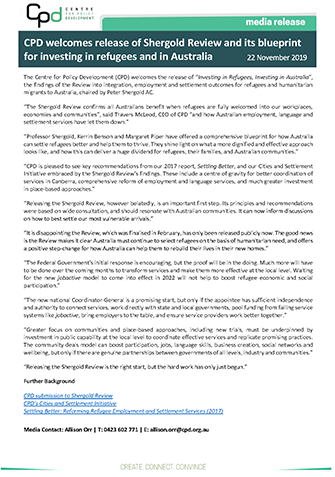
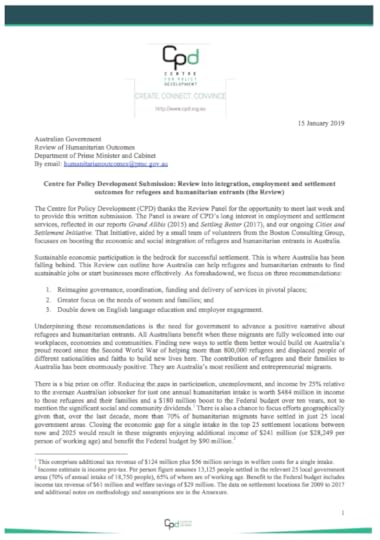
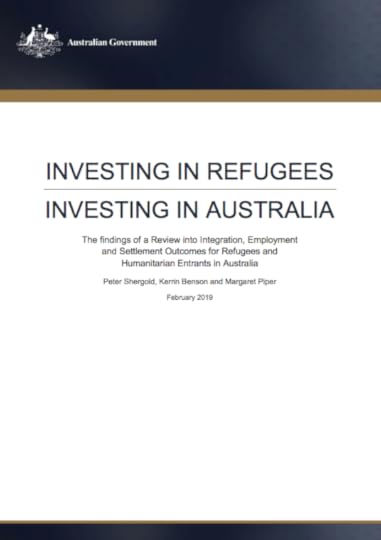
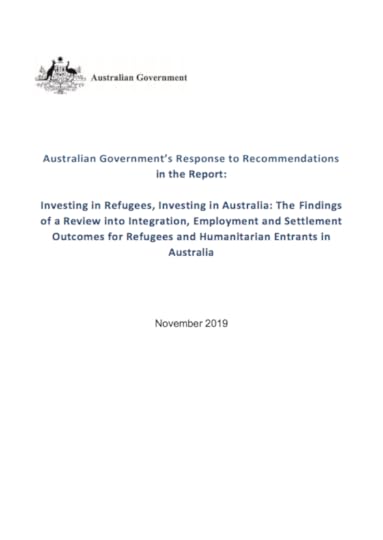
Click here to view the PDF of CPD’s media release
Click here to read CPD’s full submission to the Review
Click here to read the full review, Investing in Refugees, Investing in Australia
Click here to read the Government’s response to the Review’s recommendations
The review recognises that despite a proud settlement record, we can do much better to support refugees to make the most of their strengths, skills and experience, as early as possible in their settlement journey. The opportunity cost of not doing so, as signalled in the Settling Better report of 2017, is too high.
The Review’s recommendations embrace much of the vision and blueprint for greater economic and social participation for humanitarian migrants advanced through the Cities and Settlement Initiative and Settling Better . The Government response has endorsed and supported this vision and the key priority now will be implementing the blueprint in full to make this vision a reality.
Chief among the priorities at hand is building a centre of gravity for refugees in Canberra, to coordinate employment, settlement and language services, and to make sure the efforts of state and local government, industry and the community sector are joined up and complementary. Current arrangements under the Minister for Immigration, Citizenship, Migrant Services and Multicultural Affairs, and within the Department of Home Affairs, as well as appointing a Coordinator-General for Migrant Affairs in the department, will go part of the way to achieving the centre of gravity needed. It will be important that the right governance and advisory bodies are in place to bring in the voice of refugees, business, civil society and state and local government counterparts. Also that the relevant senior official has the independence, resources and authority needed to implement significant improvements to capability, services and partnerships needed.
Central to the vision, and to CPD’s work, is helping refugees into suitable and sustainable work, self-employment and small business sooner, and supporting them to grow and develop in their careers. Given the complex needs of refugees, this not only requires the key services to be working much more seamlessly together but also comprehensive reform to employment and language services so they are more effective in adapting to local circumstances and an individual’s journey.
A patchwork service system, including the enhanced employment service (or reformed jobactive) slated for July 2020, other Commonwealth and state employment related programs, and a maze of language and settlement supports, will simply not deliver what’s needed. As advocated by CPD, the review recommends trialling specialist place-based employment services, that engage all service providers and support organisations in delivering on a refugee’s personal plan and desired outcomes, and meeting the needs of local employers. This approach is being trialled by Wyndham City Council and partners, and supported by CPD in the Improving Economic Participation for Refugees project. The project was profiled in the Government’s response to the Shergold review.
The Community Deals model, emerging from the Cities and Settlement Initiative , provides the structure and operating model to replicate and expand these place-based initiatives in the location settling the most refugees across Australia. Place-based approaches also provide the opportunity to harness the goodwill and resources of Australian communities to support refugees settling in their local areas, including in our regional towns.
The review has done an excellent job at gathering the analysis and good practice of actors across Australia and weaving a comprehensive vision for greater refugee economic and social integration. It aligns strongly with CPD’s thinking. The job at hand is to make that vision a reality through the implementation of the full blueprint for action recommended.
Media coverage
Helping refugees find work, Stephanie Borys, ABC AM, 23 November 2019
Government wants half of new refugees to be settled in ‘regional’ Australia by 2022, Michael Koziol, Sydney Morning Herald, 22 November 2019
Secret report urged Morrison government to create ‘more positive narrative’ on refugees, Michael Koziol, Sydney Morning Herald, 29 September 2019
The post CPD welcomes release of Shergold Review and its blueprint for investing in refugees and in Australia | MEDIA RELEASE appeared first on Centre for Policy Development.
Centre for Policy Development's Blog
- Centre for Policy Development's profile
- 1 follower





